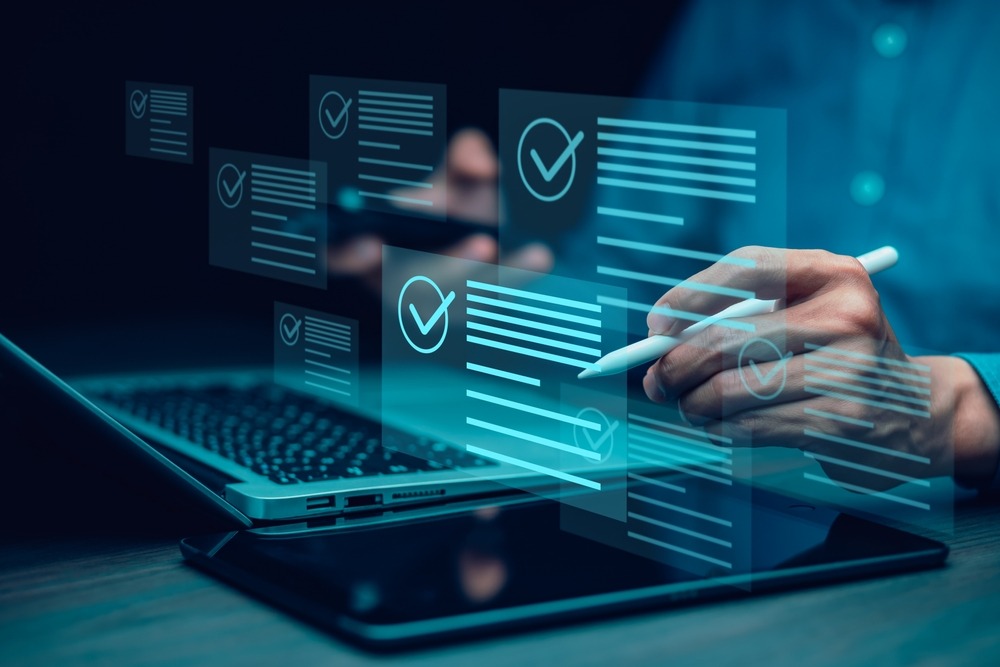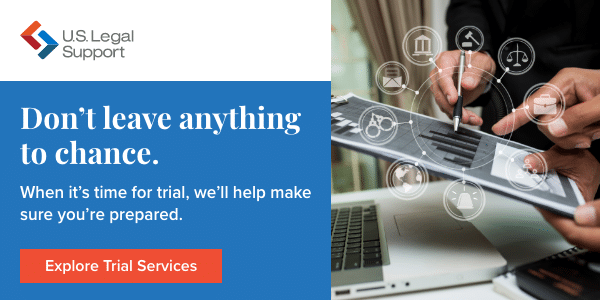Trial Preparation Checklist for Lawyers: A Guide to Success

Have you ever had the classic dream of showing up to school or work in your underwear? For attorneys, being unprepared for the first day of a trial can invite the same skin-crawling shudder.
Whether you’re a seasoned professional or relatively new to courtroom litigation, a thorough and uniform approach, along with practice, is necessary to keep your team on track and avoid any missed steps. To that end, a trial preparation checklist serves as an essential organizational tool that covers documents, witnesses, exhibits, logistics, and more.
Pre-Trial Case Review and Strategy Planning
Most legal matters are resolved prior to entering into a trial—between 94–97% conclude with either a settlement or plea bargain.1,2 This means you may not necessarily begin a case with a trial preparation checklist on hand. After all, how you utilize discovery findings at a negotiation table may be dramatically different from what you need to highlight and cover for the more highly regulated courtroom environment.
Review Pleadings, Discovery, and Motions
As a first step in trial preparation, take a fresh look at case materials to date, reviewing every form and document thoroughly. Consider how these can be leveraged, developed, or revisited for trial purposes:
- Case research
- Witness interviews
- Deposition recordings and transcripts
- Pleadings
- Motions
Develop Trial Theme and Case Narrative
Two of the most creative and critical components of presenting your case are theme and narrative, setting the stage for your opening statements.
Trial Theme
While case theory is a direct interpretation of facts and logic, the trial theme is a statement or phrase employed throughout the proceedings to represent it. The repetition helps secure it in jurors’ minds as a consistent, believable framework.
Case Narrative
Narrative requires connecting facts and actions sequentially to support the motives and logic of your case theory. However, you’ll have little success presenting these to the jury in a dry list format.
Studies show that storytelling sparks neurological connections that trigger empathy, emotions, and engagement, and helps listeners absorb and retain facts as much as 22 times better than outside the context of a story.3
To that end, narrative is most effectively communicated through storytelling with a beginning, middle, and end, which highlights clear-cut motivation and well-rounded characters.
Outline Burden of Proof and Key Legal Arguments
Do the elements of your case meet the burden of proof? Review each fact, evidence, and argument for validity depending on the case type4:
- Criminal – The prosecutor must prove the defendant’s guilt beyond a reasonable doubt.
- Civil – The plaintiff must prove that, according to the evidence, their presentation of the facts in dispute is more likely than not to be true (i.e., “a preponderance of the evidence”).
Other types of cases and motions have varying requirements for proof, such as “clear and convincing” for will disputes and “substantial” for cases heard on appeal.
Witness Preparation
If your panel of witnesses is uniformly articulate, professionally attired, and familiar with courtroom mores, witness preparation may be a snap… But that’s rarely the case. This stage of trial preparation is where counsel ensures each witness is well-prepared for their role.
Witness selection and preparation can be a time-consuming and complex process that goes well beyond who exactly knows (or saw, or heard, or believes) what.
Identify and Schedule Witnesses
Depending on the story and facts you need to present to a judge and jury, identifying your ideal witness list can be a challenge and require careful strategic planning.
- Lay witnesses – With ordinary individuals who can offer either eyewitness or other relevant testimony, you may not have much choice other than whether to use or exclude them. In some cases, however—particularly class action—you may have a pool to draw from, making it essential to assess who will provide the most useful testimony and impression.
- Expert witnesses – Selecting expert witnesses starts with identifying what type of testimony or fact explorations are necessary to support your case theory. Then, locate and prepare expert witnesses who are available and ensure their analysis supports your argument.
- Character witnesses – Lawyers may have the greatest latitude in deciding whether to use and choose specific character witnesses. Ideal targets are those who can present an appearance of trustworthiness and solicit empathy for your client.
It would be a relief to consider scheduling a simple administrative matter, but the logistics of ensuring all of your witnesses are available when needed during a trial is not something to take lightly. The use of remote and hybrid proceedings has helped reduce the calendaring and cost strain of accessing distant witnesses. However, witness scheduling remains a task that requires ongoing monitoring.
Conduct Mock Examinations, Depositions and Trials
Witness preparation in a complex trial is often supported by experts who can tailor the process to a specific legal matter’s needs, environment, and challenges. Consider whether your case can benefit from:
- Mock depositions
- Mock examinations
- Focus group findings
- Mock trials
There’s a world of difference separating mock depositions and examinations from handing a witness a list of tips and discussing what types of questions they might be asked.
Basic prep can help witnesses with everything from clothing selection to when to answer a yes-or-no question with a single word. Mock events, on the other hand, can truly test their (and your) assumptions about how they’ll function in a potentially hostile questioning environment.
Prepare Expert Witness Reports and Exhibits for Thorough Trial Preparation
What exhibits or reports will accompany your expert witnesses? These can range from slide presentations to complex interactive exhibits or 3D models.
Plan early to provide enough time to commission, review, and tweak trial exhibits that will help your experts bring dry facts to life for the jury.
Exhibit and Evidence Management
The last thing you need at trial is a missing presentation or piece of evidence. Be sure to check each item carefully against the following steps.
Organize and Number Exhibits
Use an inventory to organize and cross-reference your exhibits, including tagging them with keywords so you can quickly locate information when you need to tweak your arguments or order of presentation in real time.
Check with your jurisdiction on their specific requirements for submitting evidence and how to number, label, and organize both digital and physical items.
Confirm Admissibility and Relevance
You may need to dive deep into the Federal Rules of Evidence or more specific jurisdictional requirements for unique, complex, and digital evidence, as admissibility restrictions vary slightly.
At a general level, ensure your exhibits and evidence are5:
- Relevant
- Not unduly prejudicial
- Not confusing or misleading
- Not in violation of privilege
- Not inadmissible hearsay
Create Digital and Hard Copy Trial Binders
Don’t skip the heavy binder! Although you may plan to rely on digital exhibits and files, hard copies of everything are essential for:
- Submitting to the court
- Providing to the opposing team
- Back-up in case of a technology failure
Courtroom Logistics and Technology Setup: What Lawyers Need to Know
Whether your trial is fully live or uses a hybrid format, technology and logistics are key categories for your trial preparation checklist.
Book Court Reporters and Trial Presentation Specialists
Court clerks are usually responsible for booking court reporters or services for trials, but there may be some crossover. Attorneys may wish to book their own:
- Court reporter in jurisdictions or proceedings that rely on automated record-keeping
- Real-time transcriptionist to support strategic shifts or impeachment opportunities
- Court reporter for trial types that are exceptions to a clerk-ordered court reporter
A trial presentation specialist can be on-site (or virtually available in a remote trial setting) to fully manage your digital exhibits, evidence handling, connectivity, and more including providing immediate help for any technology glitches.
If you plan to use an external trial presentation specialist, it helps to have them on board prior to proceeding with the next steps.
Test AV Equipment, Remote Tools, and Presentation Software
Have all participants—team members, support service providers, witnesses, clients—test any and all equipment or software they will engage with during the trial.
Confirm Courtroom Rules and Technical Requirements
In addition to ensuring your own technology and media are functional and ready for trial, take advantage of as much latitude as you’re given to investigate and test the courtroom environment.
This may range from requesting a spec sheet and testing remote functions to stepping foot inside a live courtroom to identify its audiovisual components, connectivity, and details, such as acoustics or blind spots.
Final Trial Preparation Tasks
Before a trial begins, ensure you have refined and completed:
- Jury instructions and voir dire questions
- Pre-trial motions and disclosure filings
- Final team meeting and role assignments
As you use a trial prep checklist, make notes and continually refine it to ensure consistency with firm workflow, jurisdictional patterns, and practice area specifics.
Use This Checklist to Stay Organized and Trial-Ready
Every trial is unique, but there are nevertheless universal elements and requirements that need to be addressed. Using a trial prep checklist is an effective way to avoid miscommunications, missed deadlines, and missteps that could impact your trial outcome.
Raise the bar on your successful trial outcomes by pairing useful preparation materials with the best in litigation support professionals.
TrialQuest, the trial services division of U.S. Legal Support, can help you at each stage of litigation preparation. We offer strategic consulting, voir dire and jury research and consulting, mock trials, witness preparation, trial graphics and demonstratives, and trial presentation and technology services.
Reach out today to find out more about how TrialQuest and U.S. Legal Support can help with your trial services, as well as court reporting, realtime transcription, interpreting, records retrieval and analysis, and more.
Sources:
- The Outline. Most criminal cases end in plea bargains, not trials. https://theoutline.com/post/2066/most-criminal-cases-end-in-plea-bargains-not-trials
- The Law Dictionary. What Percentage of Lawsuits Settle Before Trial? What Are Some Statistics on Personal Injury Settlements? https://thelawdictionary.org/article/what-percentage-of-lawsuits-settle-before-trial-what-are-some-statistics-on-personal-injury-settlements/
- Marketing Words. Storytelling Statistics: Why Marketing Storytelling Works So Well. https://blog.marketingwords.com/storytelling-stats/
- Cornell Law School. burden of proof. https://www.law.cornell.edu/wex/burden_of_proof
Cornell Law School. admissible evidence. https://www.law.cornell.edu/wex/admissible_evidence

Editoral Policy
Content published on the U.S. Legal Support blog is reviewed by professionals in the legal and litigation support services field to help ensure accurate information. The information provided in this blog is for informational purposes only and should not be construed as legal advice for attorneys or clients.


